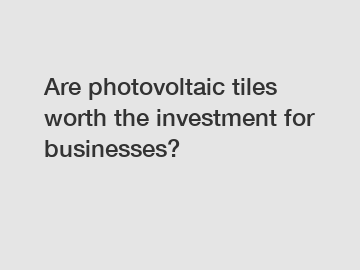Are photovoltaic tiles worth the investment for businesses?
Photovoltaic tiles are a hot topic these days, with many businesses considering investing in this renewable energy technology. But are they truly worth the investment? Let's take a deeper look at the benefits and drawbacks of photovoltaic tiles for businesses.
First and foremost, photovoltaic tiles offer a sustainable and environmentally friendly way to generate electricity. By harnessing the power of the sun, businesses can significantly reduce their carbon footprint and reliance on fossil fuels. This not only helps the environment but also positions businesses as socially responsible and forward-thinking.
In addition to the environmental benefits, photovoltaic tiles can also lead to significant cost savings for businesses. By generating their own electricity, businesses can reduce their reliance on traditional energy sources and lower their utility bills. Over time, the cost of installing and maintaining photovoltaic tiles can be offset by these savings, making them a sound financial investment.

Furthermore, photovoltaic tiles can provide businesses with energy independence and security. By generating their own electricity on-site, businesses can avoid disruptions to their power supply caused by outages or grid failures. This can be especially important for businesses that rely on a steady source of power to operate effectively.
Another key benefit of photovoltaic tiles is their versatility and scalability. These tiles can be installed on a variety of surfaces, including rooftops, facades, and even windows, making them a flexible option for businesses looking to integrate renewable energy into their operations. Additionally, businesses can start small with a few tiles and gradually expand their solar array as their energy needs grow.
Despite these benefits, there are some drawbacks to consider when it comes to investing in photovoltaic tiles for businesses. One of the main challenges is the upfront cost of installation. While the long-term savings can offset this initial investment, businesses may need to secure financing or incentives to make the transition to solar power more affordable.
Additionally, the efficiency of photovoltaic tiles can vary depending on factors such as location, orientation, and shading. Businesses located in areas with limited sunlight or a lot of shading may not see the same returns on their investment as businesses in sunnier climates. It's important for businesses to conduct a thorough assessment of their site and energy needs before committing to installing photovoltaic tiles.
Another consideration for businesses is the maintenance and upkeep required for photovoltaic tiles. While these systems are generally low-maintenance, they do require periodic cleaning and inspections to ensure they are functioning at optimal levels. Businesses may need to budget for these ongoing costs to keep their solar array running smoothly.
In conclusion, photovoltaic tiles can be a worthwhile investment for businesses looking to reduce their carbon footprint, save on energy costs, and increase their energy independence. While there are upfront costs and considerations to take into account, the long-term benefits of solar power make it a compelling option for businesses of all sizes.
Ultimately, the decision to invest in photovoltaic tiles will depend on each business's unique circumstances and goals. By weighing the benefits and drawbacks carefully and consulting with renewable energy experts, businesses can make an informed decision about whether photovoltaic tiles are worth the investment for their operations.
For more solar roof tiles china, photovoltaic tiles roofing system, solar roof tilesinformation, please contact us. We will provide professional answers.
110
0
0


Comments
All Comments (0)